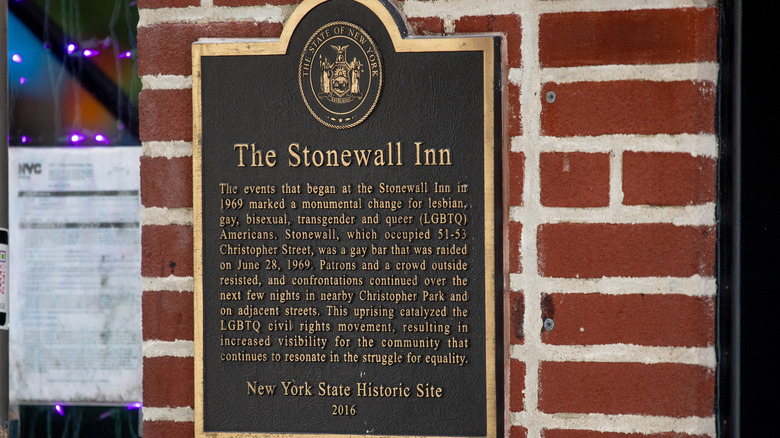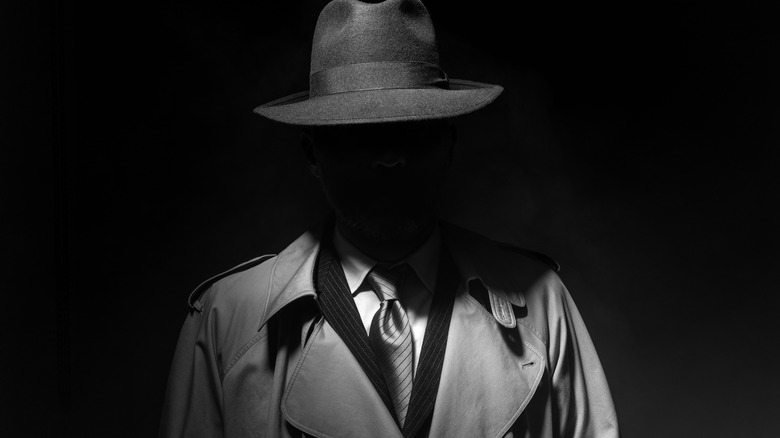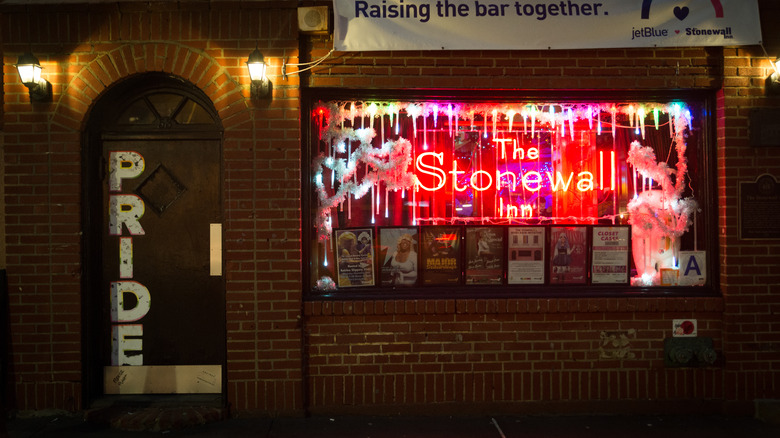What Happened To The Stonewall Inn?
Stonewall is a name you'll hear quite often in LGBTQ+ culture, especially during Pride Month. The name is a reminder of the struggles queer ancestors went through in their fight for basic human rights and tolerance in American society, a fight in both the worldview sense and the physical, which is commemorated now with parades and celebrations that say "we are here," with emblematic rainbow designs all on display during the month of June. And it all started at a private gay club called the Stonewall Inn.
On June 28, 1969, police raided the Stonewall Inn. This happened, often as bars weren't really allowed to cater to LGBTQ+ folk at the time. Whatever happened next is a bit of a mystery, according to TIME, but it sparked a commotion that ended with nearly a week's worth of rioting by a group of people who were tired of being bullied by society. This historic period is called an "uprising" by some and a "riot" by others. You can say what you will about riots, but history has shown they're an effective tool when used by an oppressed class that can't otherwise be heard, and the Stonewall Uprising was a major step in gaining rights for LGBTQ+ people in the United States.
When the riots finished, activists from all over the world were drawn into the struggle, and despite police barricading themselves in Stonewall Inn during a portion of the events, the historic bar was still standing when the dust settled. Then what?
Once a mob-owned club
Leading up to the 1960s, most forms of LGBTQ+ sexualities and identity expressions were illegal throughout the majority of the country. At the time of the Stonewall Riots, homosexuality was technically legal in the state of New York, according to PBS, though as noted by Mental Floss, there were statues that required people to wear "gender appropriate" clothing. Even with homosexuality being legal, state authorities and other groups, not to mention the general public, found creative ways to keep the LGBTQ+ community down. For instance, the state liquor authority would claim gay bars carried out illegal offenses on the regular, giving them the right to refuse their liquor license. Obviously, this made places like the Stonewall Inn difficult to operate legally, and that's where the mob comes in.
The mob, at its core, is a business entity. Sure, they don't necessarily operate inside the law, but as with any other business, the mob's main goal is making money. Gay bars provided plenty of it, and in the form of cash. The New York mafia owned most of the states LGBTQ+ bars because it was an untapped market. People pushed to the fringes of society could gather and be themselves, and a liquor license didn't make a single bit of difference to mobsters whose organization grew out of the Prohibition era. The Stonewall Inn, in particular, was owned by the Genovese crime family after "Fat Tony" bought the place in 1966. But that was all before the riots.
The Stonewall Inn after the riots
Not long after the Stonewall Riots, the famed establishment closed down. In a history described by the NYC LGBT Historic Sites Project, the location, originally combining 51 and 53 Christopher St., went through a series of changes through years, most of which were mundane. The buildings transitioned from gay bar and catalyst for the United States LGBT Rights Movement to bagel shop, to Chinese restaurant, and to clothing store, before being bought in 1987, when one of two buildings was converted to a different bar named Stonewall. This Stonewall only lasted two years, closing in 1989, but Stonewall wouldn't stay down. Another bar named Jimmy's Stonewall was opened in the other building in 1990, which later converted its name to Stonewall and then back to Stonewall Inn in 2006.
Given the location's history, it's grown into more than a bar over the years. In 1989, the portion of the street that runs in front of the building was renamed "Stonewall Place" in memory of the uprising 20 years before, and in 2000, it was listed as a National Historic Landmark. The commendations didn't stop. Several monument designations have been given to the site as well, including National Monument status bestowed on Stonewall in 2016 by President Barack Obama.
The Stonewall Inn, as you can imagine, has become both a tourist attraction and a kind of holy place within the LGBTQ+ community, where everyone's welcome and you can now enjoy a crisp IPA with the same reverent name from Brooklyn Brewery.


